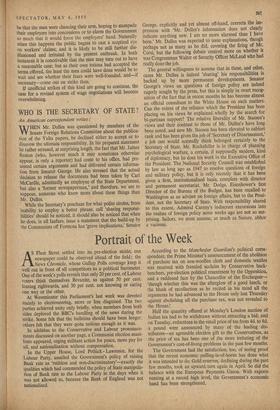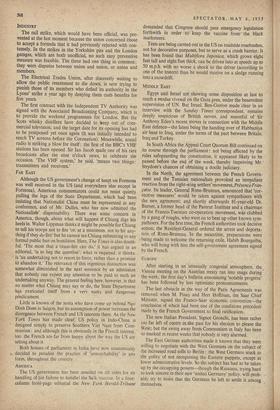Portrait of the Week
S Fleet Street settled into its pre-election stride, one newspaper could be observed ahead of the field : the News Chronicle, whose Gallup Polls coverage keep it well out in front of all competitors as a political barometer. One of the week's polls reveals that only 20 per cent. of Labour voters think themselves Bevanite, as against 50 per cent. leaning rightwards, and 30 per cent. not knowing or caring one way or the other. According to the Manchester Guardian's political corre- spondent. the Prime Minister's announcement of the abolition of purchase tax on non-woollen cloth and domestic textiles was received with frenzied acclaim by Conservative back- benchers, pre-election political resentment by the Opposition, and a reddened face by the Chancellor of the Exchequer— `though whether this was the afterglow of a good lunch, or the blush of recollection as he recited in his mind all the arguments he had advanced to the House only last Thursday against abolishing all the purchase tax, was not revealed to the House.'
Half the quantity offered at Monday's London auction of Indian tea had to be withdrawn without attracting a bid; and on Tuesday, reductions in the retail price of tea from 4d. to 8d. a pound were announced by many of the leading dis- tributors—an agreeable election gift to the Conservatives, as the price of tea has been one of he more irritating of the Government's cost-of-living problems in the past few months.
The Government had the satisfaction, too, of seeing proof that the recent economic pulling-in-of-horns has done what it was intended to do. Gold reserves, declining during the past few months, took an upward, turn again in April. So did the balance with the European Payments Union. With exports running at a record high level, the Government's economic hand has been strengthened.
INDUSTRY
The rail strike, which would have been official, was pre- vented at the last moment because the union concerned those to accept a formula that it had previously rejected with con- tumely. In the strikes in the Yorkshire pits and the London garages, which are both unofficial, no such easy preventive measure was feasible. The three had one thing in common: they were disputes between union and union, or union and members.
The Electrical Trades Union, after discreetly waiting to allow the public resentment to die down, is now trying to punish those of its members who defied its authority in the Lyons' strike a year ago by denying them cash benefits for five years.
The first contract with the Independent TV Authority was signed with the Associated Broadcasting Company, which is to provide the weekend programmes for London. But the Scots whisky distillers have decided to keep out of com- mercial television; and the target date for its opening has had to be postponed yet once again (it was initially intended to reach TV screens before the Coronation). Meanwhile, sound radio is striking a blow for itself : the first of the BBC's VHF stations has been opened. Sir Ian Jacob made one of his rare broadcasts after the nine o'clock news, to celebrate the occasion. 'The VHF system,' he said, 'means two things : transmitters and receivers.'
FAR EAST Although the US government's change of heart on Formosa was well received in the US (and everywhere else except in Formosa), American commentators could not resist quietly pulling the legs of the State Department, which had been insisting that Nationalist China must be represented at any conference, and of Mr. Dulles. who has now admitted the Nationalists' dispensability. There was some concern in America, though, about what will happen if Chiang digs his heels in. Walter Lippman thinks it might be possible for Chiang to tell his troops not to fire 'or, at a minimum. not to hit any- thing if they do fire' but he cannot see Chiang submitting to any formal public ban on hostilities. Here, The Times is also doubt- ful. 'The most that a cease-fire can do.' it has argued in an editorial, 'is to beg the question'; what is required. it thinks, is 'an undertaking not to resort to force, rather than a promise to abandon it.' The relevance of this ingenious distinction was somewhat diminished in the next sentence by an admission that nobody can expect any attention to be paid to such an undertaking anyway. The general feeling here, however, is that no matter what Chiang may say or do, the State Department has extricated itself from a very nasty and dangerous predicament.
Little is known of the junta who have come up behind Ngo Dinh Diem in Saigon, but its assumption of power increases the divergence between French and US interests there. As the New York Times has made clear. US policy in Indo-China is designed simply to preserve Southern Viet Nam from Com- munism : and although this is obviously in the French interest. too. the French are far from happy about the way the US are setting about it Both houses of parliament in India have now unanimously decided to penalise the practice of 'untouchability' in anv form, throughout the country.
AM ERICA
The US government has been assailed on all sides for its handling of (or failure to handle) the Salk vaccine. Ina four- column front-page editorial the New York Herald.Tribune demanded that Congress should pass emergency legislation forthwith in order to keep the vaccine from the black marketeers.
Tests are being carried out in the US on roadside rosebushes, not for decorative purposes, but to serve as a crash barrier. It has been found that Multiflora Japonica, which grows eight feet tall and eight feet thick, can be driven into at speeds up to 50 m.p.h. with no worse a shock to the driver (according to one of the testers) than he would receive on a sledge running into a snowdrift.
MIDDLE EAST Egypt and Israel are showing some disposition at last to reach a modus vivendi on the Gaza area, under the benevolent supervision of UN. But Israel. Ben-Gurion made clear in an interview with the Sunday Times correspondent, remains deeply suspicious of British moves, and resentful of Sir Anthony Eden's recent moves in connection with the Middle East defence—the latest being the handing over of Habbaniya air base to Iraq, under the terms of the pact between Britain. Iraq and Turkey.
In South Africa the Appeal Court Quorum Bill continued on its course through the parliament: not being affected by the rules safeguarding the constitution, it appeared likely to be passed before the end of the week, thereby improving Mr.' Strydom's chances of obtaining a docile judiciary.
In the North, the agreement between the French Govern- ment and the Tunisian nationalists provoked an immediate reaction from the right-wing settlers' movement, Presence Fran- (wise. Its leader, General Rime-Bruneau, announced that 'cor- rective measures' would be taken against sympathisers with the new agreement; and shortly afterwards 81-year-old Dr. Burnet, a former head of the Pasteur Institute and a chairman of the Franco-Tunisian co-operation movement, was clubbed by a gang of roughs, who went on to beat up other known sym- pathisers. For the first time, the French authorities took decisive action; the Resident-General ordered the arrest and deporta- tion of Rime-Bruneau. In the meantime, preparations were being made to welcome the returning exile, Habib Bourguiba, who will bring with him the self-government agreement signed by the French.
EUROPE
After starting in an unusually congenial atmosphere, the Vienna meeting on the Austrian treaty ran into snags during the week; the first day's bulletin announcing 'notable progress' has been followed by less optimistic pronouncements.
The last obstacle in the way of the Paris Agreements was removed when M. Pinay and Herr Hoffman, the Saar Chief Minister, signed the Franco-Saar economic convention—the conclusion of which had been one of the conditions precedent made by the French Government to final ratification.
The new Italian President, Signor Gronchi, has been rather too far left of, ce,ntre in the past for his election to please the West; but the swing away from Communism in Italy has been so marked m recent weeks that nobody is very alarmed.
The East German authorities made it known that they were willing to negotiate with the West Germans on the subject of the increased road tolls to Berlin : the West Germans stuck to the policy of not recognising the Eastern puppets, except at lower administrative levels. So the subject has had to be taken up by the occupying powers—though the Russians, trying hard to look sincere in their new 'united Germany' policy. will prob- ably try to insist that the Germans be left to settle it among themselves.











































 Previous page
Previous page